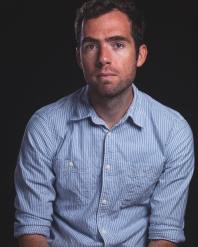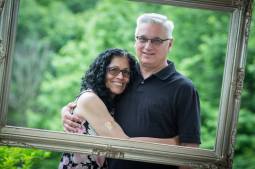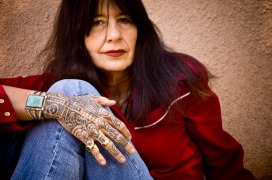Texts: Acts 7:55-60 + Psalm 31:1-5,15-16 + 1 Peter 2:2-10 + John 14:1-14
 Earlier this week at our monthly staff meeting we acknowledged that it was the last meeting that Luke, who has been our Diaconal Intern for the last nine months, would be attending. So we took some time to reflect back to Luke the gifts we see in him, and to share some words of thanks for his ministry with us. Then we indulged ourselves with a long lunch at the Chicago Diner up on Milwaukee Ave. Luke’s internship ends three week from now, on Pentecost Sunday, and he will continue to be connected to St. Luke’s as a member, so there’s no need to rush to say your own goodbyes — but it got me thinking about the importance of saying our goodbyes well.
Earlier this week at our monthly staff meeting we acknowledged that it was the last meeting that Luke, who has been our Diaconal Intern for the last nine months, would be attending. So we took some time to reflect back to Luke the gifts we see in him, and to share some words of thanks for his ministry with us. Then we indulged ourselves with a long lunch at the Chicago Diner up on Milwaukee Ave. Luke’s internship ends three week from now, on Pentecost Sunday, and he will continue to be connected to St. Luke’s as a member, so there’s no need to rush to say your own goodbyes — but it got me thinking about the importance of saying our goodbyes well.
 Later this morning we’ll be saying goodbye to Ray Pickett and Liz Muñoz, who are leaving Chicago and heading west to Berkeley, California at the end of the month. After we’ve had the chance to share the Lord’s Supper once again, we’ll gather with them in a circle of song to bless them on their journey. As we were preparing for that sending earlier in the week, I remembered of all the many times we gathered in the old church building in the center aisle and laid hands on members of our community who were preparing to leave us. How important it can be to have a chance to offer one another words and signs that call to mind who we have been to each other, what it has meant, and how we will carry that forward.
Later this morning we’ll be saying goodbye to Ray Pickett and Liz Muñoz, who are leaving Chicago and heading west to Berkeley, California at the end of the month. After we’ve had the chance to share the Lord’s Supper once again, we’ll gather with them in a circle of song to bless them on their journey. As we were preparing for that sending earlier in the week, I remembered of all the many times we gathered in the old church building in the center aisle and laid hands on members of our community who were preparing to leave us. How important it can be to have a chance to offer one another words and signs that call to mind who we have been to each other, what it has meant, and how we will carry that forward.
That’s what Jesus is doing as he speaks to his friends and followers in this morning’s gospel text. This passage comes from a section of the gospel of John known as the Farewell Discourse, and comes immediately following Jesus’ washing of the disciples’ feet which we remembered in our worship on Maundy Thursday just over a month ago now. So, to hear these words rightly, we need to allow ourselves to return to that place of vulnerability as the disciples gathered with Jesus for a last supper before his death. We need to remember how afraid they were, the tension in the room as Jesus spoke about his betrayal by one of their own and forecasted Peter’s own impending denials. It was the moment when everything they’d experienced together seemed on the verge of falling apart, when all their hopes and dreams for the future seemed lost. In those last hours together, Jesus spoke to them about a way of being, a manner of life, in which they would remain together forever, no matter what else might happen.
“And if I go and prepare a place for you, I will come again and will take you to myself, so that where I am, there you may be also. And you know the way to the place where I am going.” (John 14:3-4)
In the church’s wisdom, we read portions of the Farewell Discourse during the season of Easter, after the story of the resurrection has been told. We’re nearly forty days into the fifty day season of Easter, so the Alleluia’s joyous return has lost just a little of its sparkling edge and we’ve had a few weeks to wonder what we mean when we declare together that “Christ is risen indeed!” By placing this reading a month after Easter, the lectionary anticipates some of the struggles we face, living as we do after the resurrection. We read these words of farewell after we have lived through the drama of Maundy Thursday, Good Friday, the Vigil of Easter and Easter morning the way one might go back and re-read a parting letter from a parent or a grandparent years later, listening for how their last words might make sense of our lives now that we have had a little more time to grow into ourselves.
That’s what I hear in Jesus’ final words to the disciples. Reassurance that they will be alright, that they have what they need, that they know the way. Thomas doubts this, on behalf of us all, “Lord, we do not know where you are going. How can we know the way?” Philip asks for one more sign for reassurance, “Lord, show us the Father, and we will be satisfied.” In his responses to each of them, Jesus does nothing more than point them toward their memories of all that they have already seen. “I am the way, and the truth, and the life” means nothing unless you have already walked with Jesus, as Thomas has, and as we have. “Whoever has seen me has seen the Father” makes no sense unless spoken to people who have seen Jesus, as Philip has, as we have.
As the community grapples with their terror on the eve of Jesus’ death, he instructs them to remember — remember who he is, remember where they have been, remember what they have seen, remember what he said and did. Later, as they face new terrors, as Stephen did on the day of his martyrdom, as the psalmist imagines in Psalm 31 where it is written, “My times are in your hand; deliver me from the hand of my enemies and persecutors” (Ps. 31:15) they look back. In these moments we can imagine that the early church searched its memory for some word of Jesus’s that might hold them with integrity as they stood in times of trial. In those moments, the living memory of their Lord found new expression in their own acts of faithfulness. Stephen offers a testimony so powerful and so challenging to the powers of the world as it is that they have him stoned to death, but even as he dies he prays for their redemption, reflecting the imprint of Jesus’ death on his own life.
We, who look back in time to the witness of Christ’s death and resurrection, look at the future with new eyes. That moment has become, for us, the cornerstone to a new construction of reality so that now we become signs of a dawning future; of a chosen race, which is the human race; a holy vocation for each and every person; a new nation beyond borders; God’s own people, all of us. “Once you were not a people, but now you are God’s people.” (1 Pet. 2:9-10) This is the power of the resurrection. We, the church, become what we remember.
 Joy Harjo, a Native-American poet of the Muscogee Nation who turned 65 this past week, offers us this poem, titled “Remember”
Joy Harjo, a Native-American poet of the Muscogee Nation who turned 65 this past week, offers us this poem, titled “Remember”
Remember the sky that you were born under,
know each of the stars’ stories.
Remember the moon, know who she is.
Remember the sun’s birth at dawn, that is the
strongest point of time. Remember sundown
and the giving away to night.
Remember your birth, how your mother struggled
to give you form and breath. You are evidence of
her life, and her mother’s, and hers.
Remember your father. He is your life, also.
Remember the earth whose skin you are:
red earth, black earth, yellow earth, white earth
brown earth, we are earth.
Remember the plants, trees, animal life who all have their
tribes, their families, their histories, too. Talk to them,
listen to them. They are alive poems.
Remember the wind. Remember her voice. She knows the
origin of this universe.
Remember you are all people and all people
are you.
Remember you are this universe and this
universe is you.
Remember all is in motion, is growing, is you.
Remember language comes from this.
Remember the dance language is, that life is.
Remember.
I think this is what we mean when we say goodbye to one another. Remember me. Remember us. Remember what this has been. Remember the reality in which you and me, then and now and yet to come, are all part of an indivisible whole, a reality deeper than right and wrong, a reality that reconciles sin and debt and trespass with forgiveness and rebirth. Remember birth. Remember death. Remember the birth beyond death. Remember who you come from and you will know the way, you will know the truth, you will know the life. You will know where you are going.
Remember.